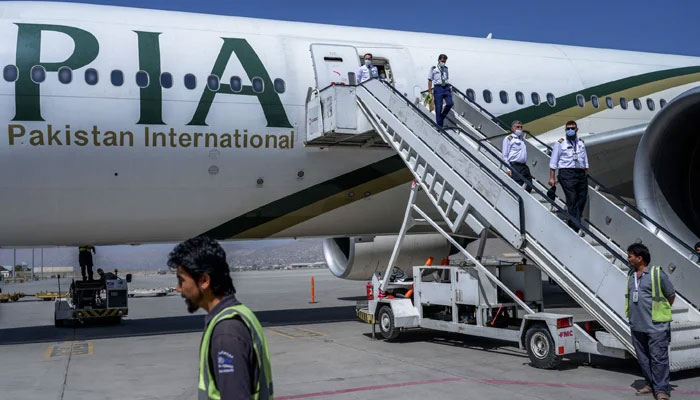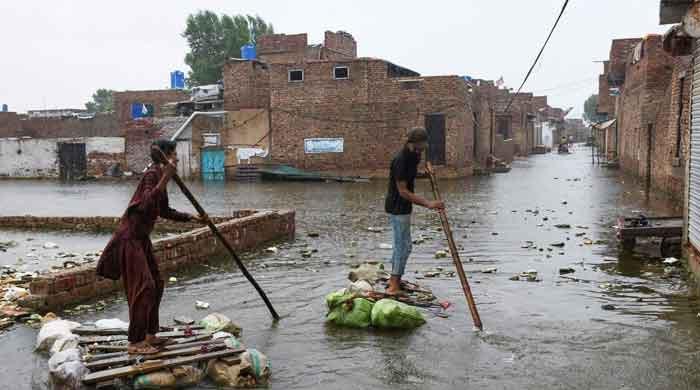Is privatisation the answer?
Privatisation in Pakistan has fallen short of achieving its intended goals, commitments. This policy needs a serious review.
April 21, 2024

The newly elected coalition government led by Prime Minister Shehbaz Sharif is under immense IMF pressure to privatise several public-sector entities. PIA and power distribution companies (DISCOs) top the privatisation list. The privatisation of various public-sector companies is an integral part of the IMF’s conditions for a bailout package. Pakistan is looking for a fresh financial assistance plan of more than $6 billion. The government has once again renewed its commitment to privatise the remaining state-owned enterprises and assets.
The PML-N government wants to privatise the oil, gas and power sectors and other utilities and services. Minister for Privatisation Abdul Aleem Khan recently announced the decision to privatise PIA immediately. It appears that the government is bringing up the same old reasons to make a case for privatisation: financial losses, inefficiency, crippling services and overstaffing. It argues that the state has nothing to do with running enterprises.
Privatisation stands as a central pillar of neoliberalism and the free market. In today’s era, dominated by the free market and neoliberalism, the concept of a welfare state has largely faded away. Since the 1980s, there has been a widespread agreement among the ruling elite that the free market and neoliberal economic policies should be the guiding principles of our economy.
Privatisation plays a significant role in this agenda, aiming to reduce the state’s welfare role and its role in the redistribution of wealth in an attempt to minimise state interference in economic life.
The philosophy behind privatisation has its roots in the state’s role within the economy. International financial institutions and neoliberal economists argue that the state should focus on establishing regulations, while the ownership and operation of industries, services, and utilities should be left to the private sector. According to them, the state should only play the role of a regulator.
In simpler terms, privatisation means that the state no longer bears the responsibility for providing essential services to people. Instead, this responsibility is shifted to the private sector. Unlike the public sector, which aims to provide services either for free or at affordable rates, the private sector’s main drive is to maximise profits and wealth.
The history of privatisation in Pakistan shows that, while wealthy investors have reaped benefits, workers and ordinary Pakistanis have faced significant challenges. Workers have to deal with layoffs, low wages, and no legal protection against various forms of exploitation. To understand the detrimental impacts of privatisation, one can look at privatised banks and corporations and see who truly benefits from this policy.
Privatisation has, in many cases, been used to exploit the state’s assets and resources. This process often reveals a story of corruption, political favouritism, manipulation, and the formation of cartels. State monopolies have turned into private monopolies, and a segment of the ruling elite has frequently leveraged this policy for personal enrichment. Privatisation has played an important role in the elite capture of the economy.
Most state-owned industries and enterprises were privatised during the 1990-2008 period. We were told that the privatisation of public-sector enterprises will help reduce the budget deficit and our reliance on debts.
But after privatising almost all state-owned industries, more than 90% of the banking sector and 100% of the telecom sector, we are still living in an economic crisis. According to one estimate, nearly 82% of the Pakistani economy is in the hands of the private sector. Since the 1980s, we have gradually dismantled the public sector-led growth model established by the Zulfikar Ali Bhutto government. We cut public investment while the bureaucratic control of the public sector played its role in making the public sector largely inefficient.
Lack of investment, innovation, rampant corruption and bureaucratic control created crisis in the public sector. No government since the 1990s has tried to reform the public sector to make it efficient, corruption-free, service-oriented and consumer-friendly. Our private sector-led growth model might be working well for the capitalist class and big business, but it is not working well for the majority of Pakistanis and the national economy. Our economy has faced one crisis after the other in the last 30 years. We are still blaming the nationalisation drive of the PPP government in the 1970s for the economic crises caused by the neoliberal model and free market economic policies.
It is crucial to assess the outcomes of privatisation in Pakistan over the past three decades. Initial promises suggested that privatisation would reduce fiscal deficits and public debt, enhance the efficiency of privatised industries and services, lower prices, increase production rates, attract foreign and local investment, and boost employment and social spending.
Many believed it would alleviate poverty and improve living standards. However, the reality has not aligned with these promises. According to a World Bank report, 40% of the population in Pakistan lives below the poverty line.
Pakistan’s debt has soared to unprecedented levels. Poverty and unemployment have risen, while the means of production and wealth remain concentrated in a few hands. Prices have skyrocketed, making basic commodities unaffordable for many in society. Privatisation has also led to the loss of public-sector jobs and weakened workers’ rights — trade unions have been hit hard by privatization and neoliberal economic policies.
Privatisation was supposed to finance budget deficits, reduce losses, and enhance the efficiency of poorly managed entities to stimulate economic growth and create jobs. However, the promised jobs, robust growth, and economic opportunities have not materialised.
Instead of privatising loss-making enterprises, our governments sold the profit-making industries and corporations. The state kept the loss making entities (Pakistan Railways, PIA, Wapda and Pakistan Steel Mills) without making any serious effort to restructure or reform them.
Privatisation in Pakistan has fallen short of achieving its intended goals and commitments. This policy needs a serious review.
The writer is a freelance journalist.
Disclaimer: The viewpoints expressed in this piece are the writer's own and don't necessarily reflect Geo.tv's editorial policy.
Originally published in The News











